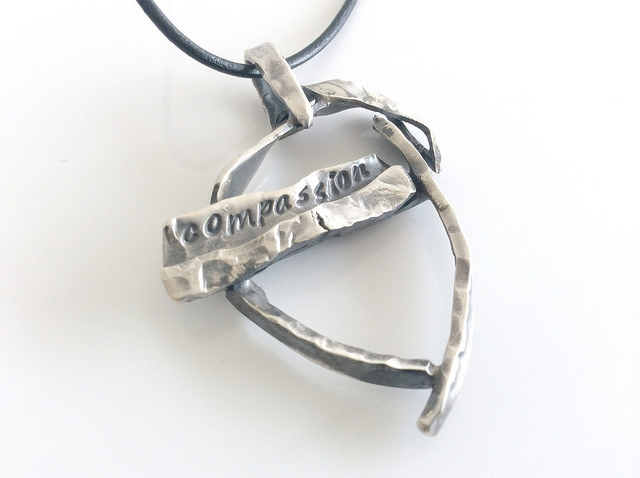My old nemesis, intolerance, has been rearing its head again recently.
A little bit directed towards me, but mostly I’ve been observing it in people around me. And, if I’m completely honest, I’ve been directing a bit of intolerance outwards too.
Time to pay attention and look within.
But as well as examining my own intolerance, I’ve been thinking about what makes situations tolerable or intolerable on a universal level. And I’ve concluded that what looks like people (myself included) putting up with “intolerable” situations, is really just us deluding ourselves—and granting others the power to disturb our peace.
We are labelling outer circumstances—which we can’t control—as intolerable, instead of recognising the intolerance within us.
And in case of any confusion, when I speak of “tolerance” I don’t mean it in any martyr-like fashion. I don’t really consider tolerance to mean a willingness to put up with bad behaviour in the sense of letting others off the hook. For me, true tolerance is about having compassion for others—seeing past the surface behaviour to the spirit beneath, which may be in turmoil at this time. Accepting that everyone is doing the best they can in any given moment. Allowing others to be themselves, to make mistakes. And choosing to send love to a person or situation that is disturbing us.
I also believe that whatever interactions we’re experiencing with others—especially those closest to us—are often mirroring whatever is going on for us emotionally.
As within, so without.
So it follows, if I’m coming up against a lot of intolerance in my world, then it must also be active within me—at some level, around some issue.
“We do not see the world as it is. We see it as we are.” ~ Anais Nin
The uncomfortable truth is that a situation is “tolerable” or “intolerable” in direct proportion to our own levels of tolerance or intolerance.
When we decide that a situation is intolerable, that is a result of our own thought process and is informed by our own intolerance. It has to be the case, because different people will regard different circumstances, or different levels of discomfort, differently.
To take a simple example, the smell of cigarette smoke in a room is intolerable to some (me, possibly), while for other non-smokers it is merely unpleasant. Not to mention that smokers don’t even notice it. What makes the smell tolerable or not reflects our own personal preferences and attitudes.
And truly, this principle can be applied to all matters of tolerance. Whether or not we are willing to see past “problem” behaviours in others is informed by our own minds and the boundaries we decide to set.
For me, this raises the question of whether there is any such thing as a truly intolerable situation?
Throughout history, extroadinary people such as Viktor Frankl have shown us that even in circumstances that are horrendous by anybody’s standards, their tolerability comes down to the outlook of each individual experiencing them.
So, to follow this logic, we must have the power to transform any “intolerable” situation to a tolerable one without needing a physical change of circumstance to take place.
An inner shift in how we perceive the situation can change how we feel about it.
I’m not advocating that we should always make that shift. It is definitely not beneficial to tolerate abusive or otherwise unhealthy situations. We are always entitled to decide that we are not going to be tolerant of something—and when we do, our job is to remove ourselves from it.
Personally, I don’t think it is fair to stay in a situation we find intolerable and inflict our intolerant feelings on those we hold responsible. Because, while each of us is responsible for our own behaviour, we are also responsible for our own feelings.
Our right is to choose: either shift how we feel or remove ourselves from the situation. We don’t have the right to insist that others change their behaviour in order for us to feel better.
Not only do we have the right to this choice—we also have the power to implement it.
When I first consciously began my spiritual journey, “patience and tolerance” was my mantra. Whenever I noticed impatience or intolerance arise within me, I took a deep breath and recited my little mantra. Over time this has—thankfully—evolved from a frequent practice to an occasional one. With self-awareness and self-compassion we can slowly and gently release the emotions that are eating us up inside.
But the first step is to stop blaming something or someone outside of ourselves for how we feel. And the second is to dig deep for compassion—extending it to ourselves (to help ease the pain of our own discomfort) and the person or situation we see as the cause of our unease.
When it comes to transforming disharmony to peace (within ourselves), we cannot force another to change—what we consider to be—“intolerable” behaviour. But, remembering that we have our own flaws, we can shift our own intolerance.
I’m not saying it’s easy. I’m just saying that we do have the capacity to “be love” even in the most challenging of times.
And when we make that shift there is a a potential bonus in that the behaviour of another may also shift—to reflect our new, calmer state of mind around them. But even if it doesn’t, we will benefit from no longer allowing something outside of us to disturb our inner state of wellbeing.
The power lies within us.
Relephant Read:
Lessons From Intolerance: My Journey Toward Compassion.
Author: Hilda Carroll
Editor: Renée Picard
Photo: Kirsten Skiles/Flickr
Facebook is in talks with major corporate media about pulling their content into FB, leaving other sites to wither or pay up if we want to connect with you, our readers. Want to stay connected before the curtain drops? Get our curated, quality newsletters below.











Read 4 comments and reply